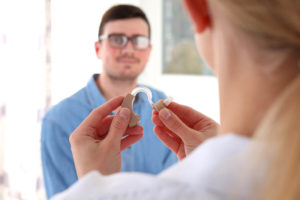Introduction
People who have just realized they have hearing loss may have some inaccurate views regarding the usage of hearing aids. The myths and facts listed here might help explain and dispel misconceptions about the devices people may have, says an expert of a well-known hearing aid clinic in Kolkata.
Hearing aid myths & facts
Myth 1: Hearing aids can restore hearing loss.
Fact: Hearing aids are not intended to restore natural hearing. The device is not a replacement for the ear and its nerve network. A hearing aid amplifies sound so that individuals can hear well. Hearing aids help people to respond correctly and hear well when having a conversation.
Myth 2: Hearing aids may entirely alleviate communication issues for those who have hearing loss.
Fact: While a hearing aid can greatly increase a person’s ability to communicate, it cannot assist a person in overcoming communication issues entirely. For example, people who wear hearing aids can have difficulty following discussions due to background noise, says the specialist of the hearing aid center in Kolkata.
Myth 3: Hearing aids might permanently damage your residual hearing.
Fact: Because hearing aids are prescribed based on the hearing loss the person has, the hearing aid itself is intended to improve hearing rather than cause more harm. You must still ensure that the hearing device is well-fitted, worn, and serviced regularly. Do everything you can to keep your hearing aid in good working order.
Myth 4: Smaller hearing aids are more technologically advanced.
Fact: Both large and tiny hearing aids are now made using cutting-edge technology. The two most common forms of hearing aids are behind-the-ear (BTE) and completely-in-the-canal (CIC). The sort of hearing loss you have determines whether or not you can wear an almost undetectable hearing aid, says the expert of the ear machine center in Kolkata.
Myth 5: A hearing aid is not required for a minor hearing loss.
Fact: It is not suggested that people wait until their hearing loss has worsened before getting a hearing device. The danger of persistent sound distortion grows with time. The longer you wait to wear hearing aids, the worse your hearing impairment becomes.
Myth 6: Hearing aids do not work for all forms of hearing loss.
Fact: While some people have been advised that a hearing aid cannot help them with their kind of hearing impairment, such as high-frequency deafness, this is not accurate. Hearing devices are now a feasible treatment for around 95 percent of the population suffering from hearing loss, thanks to developments in hearing aid technology.
Don’t put off seeking treatment if you have been diagnosed with hearing loss, says the expert of the well-known hearing aid clinic in Kolkata. Make an appointment with an audiologist in your region to discover the many types of hearing aids available to you and which style best matches your lifestyle!



